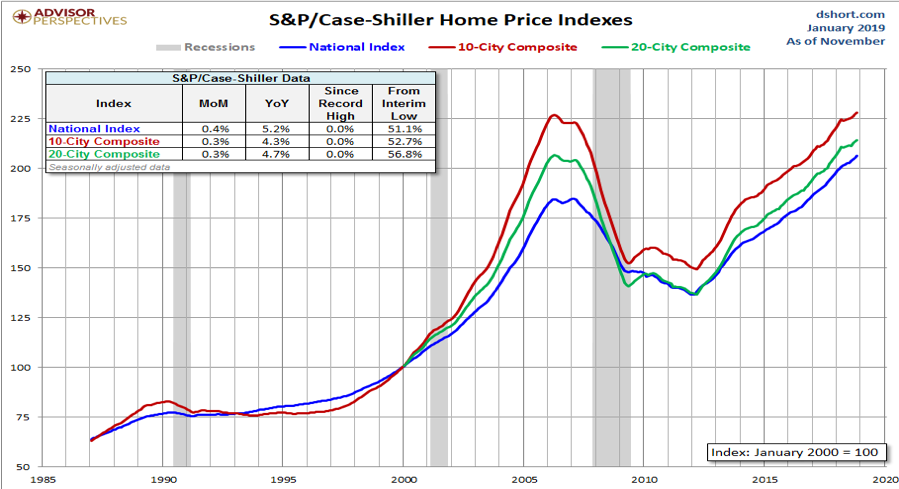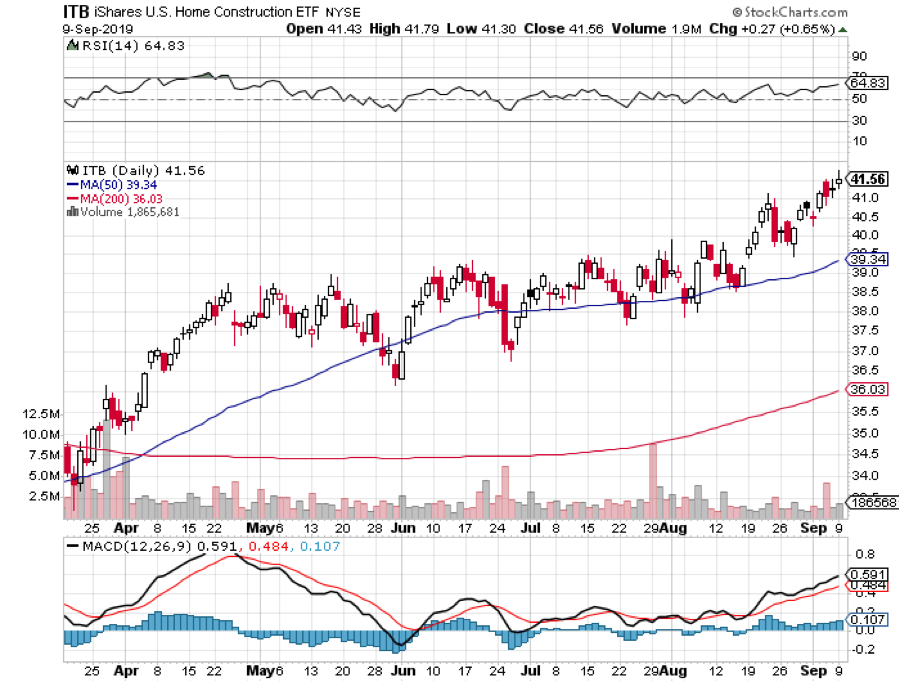Global Market Comments
December 19, 2019
Fiat Lux
Featured Trade:
(WHY THE REAL ESTATE BOOM HAS A DECADE TO RUN),
(DHI), (LEN), (PHM), (ITB)
(PLAY IT SAFE WITH ANTHEM), (ANTM), (CI)

Global Market Comments
December 19, 2019
Fiat Lux
Featured Trade:
(WHY THE REAL ESTATE BOOM HAS A DECADE TO RUN),
(DHI), (LEN), (PHM), (ITB)
(PLAY IT SAFE WITH ANTHEM), (ANTM), (CI)

Global Market Comments
September 11, 2019
Fiat Lux
Featured Trade:
(HAS THE VALUE OF YOUR HOME JUST PEAKED?),
(ITB), (PHM), (KBH), (LEN), (DHI), (NVR), (TOL),
(JOIN US AT THE MAD HEDGE LAKE TAHOE, NEVADA CONFERENCE, OCTOBER 25-26, 2019)
Lately, my inbox has been flooded with emails from subscribers asking how to hedge the value of their homes. This can only mean one thing: the residential real estate market has peaked.
They have a lot to protect. Since prices hit rock bottom in 2011 and foreclosures crested, the national real estate market has risen by 50%.
I could almost tell you the day the market bounced. That’s when a couple of homes in my neighborhood that had been for sale for years suddenly went into escrow.
The hottest markets, like those in Seattle, San Francisco, and Reno, are up by more than 125%, and certain neighborhoods of Oakland, CA have shot up by 400%.
The concerns are confirmed by data that started to roll over in the spring and have been dismal ever since. It is not just one data series that has rolled over, they have all gone bad. One bad data point can be a blip. An onslaught is a new trend. Let me give you a dismal sampling.
*Home Affordability hit a decade low, thanks to rising prices and interest rates and trade war-induced soaring construction costs
*July Housing Starts have been in a tailspin as tariff-induced rocketing costs wipe out the profitability of new homes
*New Home Sales collapsed YOY.
*14% of all June Real Estate Listings saw price cuts, a two-year high
*Chinese Buying of West Coast homes has vaporized over trade war fears
Fortunately, investors have a lot of options for either hedging the value of their own homes or making a bet that the market will fall.
In 2006, the Chicago Mercantile Exchange (CME) started trading futures contracts for the Corelogic S&P/Case-Schiller Home Price Index, which covered both U.S. residential and commercial properties.
The Case-Shiller index, originated in the 1980s by Karl Case and Robert Shiller, is widely considered to be the most reliable gauge to measure housing price movements. The data comes out monthly with a three-month lag.
This index is a widely-used and respected barometer of the U.S. housing market and the broader economy and is regularly covered in the Mad Hedge Fund Trader biweekly global strategy webinars.
The composite weight of the CSI index is as follows:
However, these contracts suffer from the limitations suffered by all futures contracts. They can be illiquid, expensive to deal in, and you probably couldn’t get permission from your brokers to trade them anyway.
If you want to be more conservative, you could take out bearish positions on the iShares US Home Construction Index (ITB), a basket of the largest homebuilders (click here for their prospectus). Baskets usually present half the volatility and therefore half the risk of any individual stock.
If real estate is headed for the ashcan of history, there are far bigger problems for your investment portfolio than the value of your home. Real estate represents a major part of the US economy and if it is going into the toilet, you could too.
It is joined by the sickly auto industry. Thanks to the trade wars, farm incomes are now at a decade low. As we lose each major segment of the economy, the risk is looming that the whole thing could go kaput. That, ladies and gentlemen, is called a recession and a bear market.
On the other hand, you could take no action at all in protecting the value of your home.
Those who bought homes a decade ago, took a ten-year cruise and looked at the value of their residence today will wonder what all the fuss is about. By the way, I met just such a person on the Queen Mary 2 last summer. Yes, ten years at sea!
And the next recession is likely to be nowhere near as bad as the last one, which was a twice-a-century event. So it’s probably not worth selling your home and buying it back later, as I did during the Great Recession.
See you onboard!



Global Market Comments
March 8, 2019
Fiat Lux
Featured Trade:
(MARCH 6 BIWEEKLY STRATEGY WEBINAR Q&A),
(SPY), (SDS), (TLT), (TBT), (GE), (IYM),
(MSFT), (IWM), (AAPL), (ITB), (FCX), (FXE)
Below please find subscribers’ Q&A for the Mad Hedge Fund Trader March 3 Global Strategy Webinar with my guest and co-host Bill Davis of the Mad Day Trader. Keep those questions coming!
Q: Are you sticking to your market top (SPY), (SDS) by mid-May?
A: Yes, at the rate that economic data is deteriorating, and earnings are falling, there’s no prospect of more economic stimulation here, my May top in the market is looking better than ever. Europe going into recession will be the gasoline on the fire.
Q: Where do you see interest rates (TLT) in 1-2 years?
A: Interest rates in 2 years could be at zero. If interest rates peaked at 3.25% last year, then the next move could be to zero, or negative numbers. The world is awash in cash, and without any economic growth to support that, you could have massive cuts in interest rates.
Q: Will (TLT) be going higher when a market panic sets in?
A: It will, which is why I’m being cautious on my short positions and why I’m only using tops to sell. You can be wrong in this market but still make money on every put spread, as long as you’re going far enough in the money. That said, when the stock market starts to roll over big time, you want to go long bonds, not short, and we may do that someday.
Q: Do you see a selloff to stocks similar to last December?
A: As long as the Fed does not raise interest rates, I don’t expect to get a selloff of more than 5% or 6% initially. If we do get a dramatic worsening of economic data and it looks like we’re headed in that direction, the Fed will start cutting interest rates, the recession signal will be on and only then will we drop to the December lows—and possibly as low as 18,000 in the Dow.
Q: General Electric has gone from $6 to $10; what would you do now?
A: Short term, sell with a 66% gain in a stock. Long term, you probably want to hold on. However, their problems are massive and will take years to sort out, probably not until the other side of the next recession.
Q: Microsoft (MSFT): long term hold or sell?
A: Absolutely long-term hold; look for another double in this company over the next 3 years. This is the gold standard in technology stocks today. Short term, you’re looking at no more than $15 of downside to the December low.
Q: Would you short banks (IYF) here since interest rates have failed to push them higher?
A: I would not; they’ve been one of the worst performing sectors of the market and they’re all very low, historically. You want to short highs like I’m doing now in the (SPY), the (IWM), and Apple (AAPL), not lows.
Q: Is the China trade deal (FXI) a ‘sell the news’ event?
A: Absolutely; there’s not a hedge fund out there that isn’t waiting to go short on a China trade deal. The weakness this week is them front-running that news.
Q: Do you see emerging markets (EEM) pushing higher from the 42 level, or will a global recession bring it back to earth?
A: First of all, (EEM) will go higher as long as interest rates in the U.S. are flatlining, so I expect a rally to last until the spring; however, when a real recession does become apparent, that sector will roll over along with everything else.
Q: Would you buy homebuilders (ITB) if this lower interest rate environment persists?
A: I wouldn’t. First of all, they’ve already had a big 28% run since the beginning of the year— like everything else—and second, low-interest rates don’t help if you can’t afford the house in the first place.
Q: Would you short corporate bonds if you think there’s going to be a recession next year?
A: I’m glad you asked. Absolutely not, not even on pain of death. I would buy bonds because interest rates going to zero takes bond prices up hugely.
Q: Should you buy stocks in front of a blackout period on corporate buybacks?
A: Absolutely not. Corporate buybacks are the number one buyers of shares this year, possibly exceeding $1 trillion. Companies are not allowed to buy their own stocks anywhere from a couple of weeks to a month ahead of their earnings release. By removing the principal buyer of a share, you want to sell, not buy.
Q: What are the chances the China trade deal (FXI) breaks down this month and no signing takes place?
A: I have a feeling Trump is desperate to sign anything these days, and I think the Chinese know that as well, especially in the wake of the North Korean diplomatic disaster. He has to sign the deal or we’ll go to recession, and that would be tough to run on for reelection.
Q: Which stock or ETF would you short on real estate?
A: If you short the iShares US Home Construction ETF (ITB), you short the basket. Shorting individual stocks is always risky—you really have to know what’s going on there.
Q: What’s the best commodity play out there?
A: Copper. If China is the only country that’s stimulating its economy right now, and China is the largest consumer of copper, then you want to buy copper. The electric car boom feeds into copper because every new vehicle needs 20 pounds of copper for wiring and rotors. Copper is also cheap as it is coming off of a seven-year bear market. What do you buy at market tops? Only cheap stuff.
Q: Why did you go so far in the money in the Freeport-McMoRan (FCX) call spread with only a 10% profit on the trade in five weeks?
A: In this kind of market, I’ll take 10% in 5 weeks all day long. But additionally, when prices are this high, I want to be as conservative as possible. Going deep in the money on that is a very low-risk trade. It’s a bet that copper doesn’t go back to the December lows in five weeks, and that’s a bet I’m willing to make.
Q: Will a new round of QE in Europe affect our stock market?
A: Yes, it’s terrible news. It will weaken the Euro (FXE), strengthen the dollar (UUP), and force US companies to lower earnings guidance even further. That is bad for the market and is a reason why I have been selling short.
Global Market Comments
February 27, 2019
Fiat Lux
Featured Trade:
(WHY CHINA’S US TREASURY DUMP WILL CRUSH THE BOND MARKET),
(TLT), (TBT), ($TNX), (FCX), (FXE), (FXY), (FXA),
(USO), (OXY), (ITB), (LEN), (HD), (GLD), (SLV), (CU),
(THE 13 NEW TRADING RULES FOR 2019)
Years ago, if you asked traders what one event would destroy financial markets, the answer was always the same: China dumping its $1 trillion US treasury bond hoard.
It looks like Armageddon is finally here.
Once again, the Chinese boycotted this week’s US Treasury bond auction.
With a no-show like this, you could be printing a 2.90% yield in a couple of weeks. It also helps a lot that the charts are outing in a major long term double top.
You may read the president’s punitive duties on Chinese solar panels as yet another attempt to crush California’s burgeoning solar installation industry. I took it for what it really was: a signal to double up my short in the US Treasury bond market.
For it looks like the Chinese finally got the memo. Exploding American deficits have become the number one driver of all asset classes, perhaps for the next decade.
Not only are American bonds about to fall dramatically in value, so is the US dollar (UUP) in which they are denominated. This creates a double negative hockey stick effect on their value for any foreign investor.
In fact, you can draw up an all assets class portfolio based on the assumption that the US government is now the new debt hog:
Stocks – buy inflation plays like Freeport McMoRan (FCX) and US Steel (X)
Emerging Markets – Buy asset producers like Chile (ECH)
Bonds – run a double short position in the (TLT)
Foreign Exchange – buy the Euro (FXE), Yen (FXY), and Aussie (FXA)
Commodities – Buy copper (CU) as an inflation hedge
Energy – another inflation beneficiary (USO), (OXY)
Precious Metals – entering a new bull market for gold (GLD) and silver (SLV)
Yes, all of sudden everything has become so simple, as if the fog has suddenly been lifted.
Focus on the US budget deficit which has soared from $450 billion a year ago to over $1 trillion today on its way to $2 trillion later this year, and every investment decision becomes a piece of cake.
This exponential growth of US government borrowing should take the US National Debt from $22 to $30 trillion over the next decade.
I have been dealing with the Chinese government for 45 years and have come to know them well. They never forget anything. They are still trying to get the West to atone for three Opium Wars that started 180 years ago.
Imagine how long it will take them to forget about washing machine duties?
By the way, if I look uncommonly thin in the photo below it’s because there was a famine raging in China during the Cultural Revolution in which 50 million died. You couldn’t find food to buy in the countryside for all the money in the world. This is when you find out that food has no substitutes. The Chinese government never owned up to it.
Global Market Comments
February 20, 2019
Fiat Lux
Featured Trade:
(THE NEXT COMMODITY SUPER CYCLE HAS ALREADY STARTED),
(COPX), (GLD), (FCX), (BHP), (RIO), (SIL),
(PPLT), (PALL), (GOLD), (ECH), (EWZ), (IDX),
(WHY THE REAL ESTATE BOOM HAS A DECADE TO RUN),
(DHI), (LEN), (PHM), (ITB)
Global Market Comments
January 15, 2019
Fiat Lux
SPECIAL ARMAGEDDON ISSUE
Featured Trade:
(HERE’S THE WORST-CASE SCENARIO),
($INDU), (SPY), (SDS), (TLT), (TBT), (FXE), (FXY),
(UUP), (DDP), (USO), (SCO), (GLD), (DGZ), (ITB)
Yesterday, I listed my Five Surprises of 2019 which will play out during the first half of the year prompting stocks to take another run at the highs, and then fail.
What if I’m wrong? I’ve always been a glass half full kind of guy. What if instead, we get the opposite of my five surprises? This is what they would look like. And better yet, this is how financial markets would perform.
*The government shutdown goes on indefinitely throwing the US economy into recession.
*The Chinese trade war escalates, deepening the recession both here and in the Middle Kingdom.
*The House moves to impeach the president, ignoring domestic issues, driven by the younger winners of the last election.
*A hard Brexit goes through completely cutting Britain off from Europe.
*The Mueller investigation concludes that Trump is a Russian agent and is guilty of 20 felonies including capital treason.
*All of the above are HUGELY risk negative and will trigger a MONSTER STOCK SELLOFF.
It’s really difficult to quantify how badly markets will behave given that this scenario amounts to five black swans landing simultaneously. However, we do have a recent benchmark with which to make comparisons, the 2008-2009 stock market crash and great recession. I’ll list off the damage report by asset class. I also include the exchange-traded fund you need to hedge yourself against Armageddon in each asset class.
*Stocks – Depending on how fast the above rolls out, you will see a stock market (SPY) collapse of Biblical proportions. You’ll easily unwind the Trump rally that started at a Dow Average of 18,000, down 25% from the current level, and off a gut-churning 9,000 points or 33% from the September top. The next support below is the 2015 low at 15,500, down 11,500 points, or 43% from the top. By comparison, during the 2008-2009 crash, we fell 52%. Everything falls and there is no safe place to hide. Buy the ProShares UltraShort S&P 500 bear ETF (SDS).
*Bonds – With the ten-year US Treasury yield peaking at 3.25% last summer, a buying panic would spill into the bond market. Inflation is nonexistent, we are running at only a 2.2% YOY rate now, so widespread deflation would rapidly swallow up the entire economy. In that case, all interest rates go to zero very quickly. The Fed cuts rates as fast as it can. Eventually, the ten-year yield drops to -0.40%, the bottom seen in Japanese and German debt three years ago. Buy the 2X short bond ETF (TBT) which will rocket to from $35 to $200.
*Foreign Exchange – With US interest rates going to zero, the US Dollar (UUP) gets the stuffing knocked out of it. The Euro soars from $1.10 to $1.60 last seen in 2010, and the Japanese yen (FXY) revisits Y80. Strong currencies then crush the economies of our largest trading partners. Their governments take their interest rates back to negative numbers to cool their own currencies. Cash becomes trash….globally.
*Commodities
Here’s the really ugly part about commodities. They are only just starting to crawl OUT of a seven-year bear market. To hit them with another price collapse now would devastate the industry. Producer bankruptcies would be widespread. The ags would get especially hard hit as they have already been pummeled by the trade war with China. Midwestern regional banks would get wiped out. Buy the DB Commodity Short ETN (DDP).
*Energy
The price of oil (USO) is also just crawling back from a correction for the ages, down from $77 to $42 a barrel in only three months. Hit the sector with a recession now in the face of global overproduction and the 2009 low of $25 becomes a chip shot, and possibly much lower. Those who chased for yield with energy master limited partnerships will get flushed. Several smaller exploration and production companies will get destroyed. And gasoline drops to $1 a gallon. The Middle East collapses into a geopolitical nightmare and much of Texas files chapter 11. Buy the ProShares UltraShort Bloomberg Crude Oil ETF (SCO).
*Precious metals
Gold (GLD) initially rallies on the flight to safety bid that we have seen since September. However, if things get really bad, EVERYTHING gets sold, even the barbarous relic, as margin clerks are in the driver’s seat. You sell what you can, not what you want to, as liquidity becomes paramount. This is what took the yellow metal down to $900 an ounce in 2009. Buy the DB Gold Short ETN (DGZ).
*Real Estate
Believe it or not, real estate doesn’t do all that bad in a worst-case scenario. It is perhaps the safest asset class around if a new crisis financial unfolds. For a start, interest rates at zero would provide a huge cushion. The Dodd-Frank financial regulation bill successfully prevented lenders returning to even a fraction of the leverage they used in the run-up to the last recession. We are about to enter a major demographic tailwind in housing as the Millennial generation become the predominant home buyers. I’ve never seen a housing slump in the face of a structural shortage. And homebuilder stocks (ITB) have already been discounting the next recession for the past year. A lot is already baked in the price.
Conclusion
Of course, it is highly unlikely that any of the above happens. Think of it all as what Albert Einstein called a “thought experiment.” But it is better to do the thinking now so you can do the trading later. There may not be time to do otherwise.
 Be Careful, They Bite!
Be Careful, They Bite!Legal Disclaimer
There is a very high degree of risk involved in trading. Past results are not indicative of future returns. MadHedgeFundTrader.com and all individuals affiliated with this site assume no responsibilities for your trading and investment results. The indicators, strategies, columns, articles and all other features are for educational purposes only and should not be construed as investment advice. Information for futures trading observations are obtained from sources believed to be reliable, but we do not warrant its completeness or accuracy, or warrant any results from the use of the information. Your use of the trading observations is entirely at your own risk and it is your sole responsibility to evaluate the accuracy, completeness and usefulness of the information. You must assess the risk of any trade with your broker and make your own independent decisions regarding any securities mentioned herein. Affiliates of MadHedgeFundTrader.com may have a position or effect transactions in the securities described herein (or options thereon) and/or otherwise employ trading strategies that may be consistent or inconsistent with the provided strategies.
